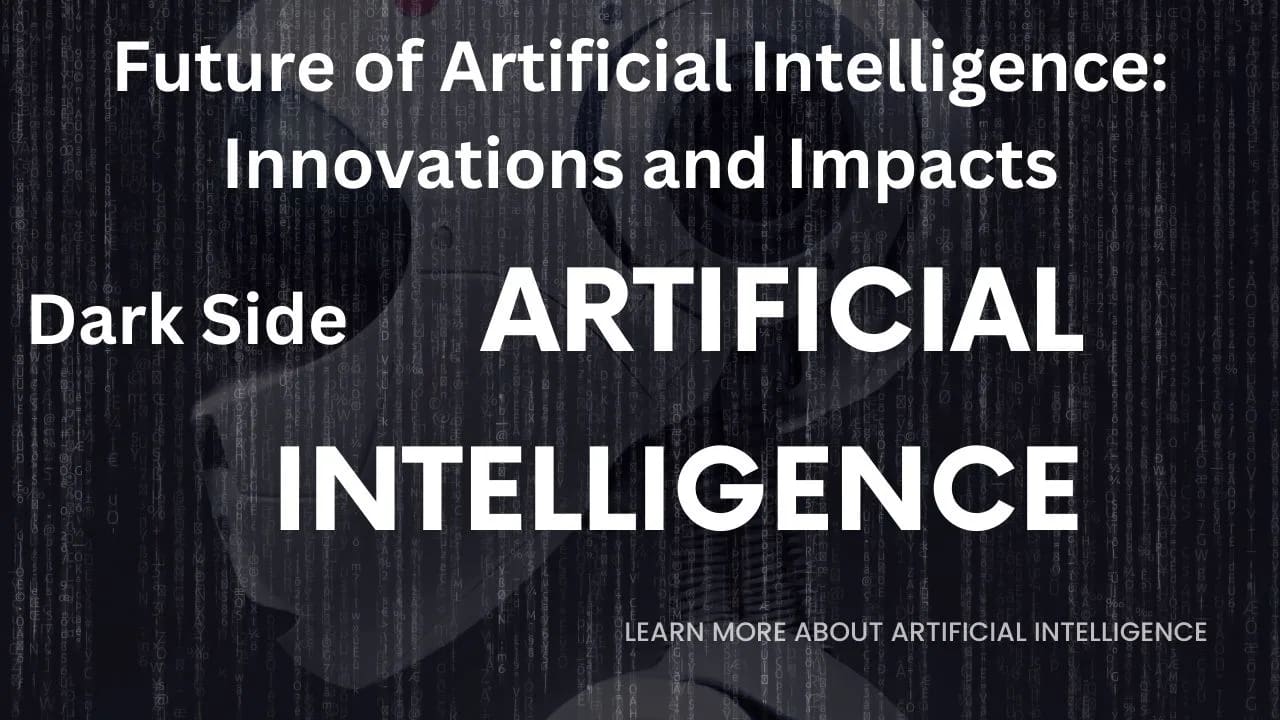Artificial Intelligence (AI) within no time has evolved as one of the most effective and transformative technologies of our time. With its ability to simulate human intelligence and automate complex tasks, AI is revolutionizing various industries and driving significant advancements. In this article, we will explore the future of artificial intelligence, its innovative applications, and the profound impacts it is likely to have on society.
1. Artificial Intelligence in Healthcare:
With the aid of machine learning algorithms, AI can analyze vast amounts of medical data to detect patterns and make accurate diagnoses. In the future, AI-powered systems could assist doctors in identifying diseases at an early stage, leading to more effective treatments and improved patient outcomes. Moreover, robotic surgery and virtual nursing assistants are just a glimpse of how AI is transforming healthcare delivery.
2. Enhancing Transportation and Logistics:
The transportation and logistics sector is undergoing a significant transformation, thanks to AI. Autonomous vehicles are a prime example of AI innovation, revolutionizing transportation by reducing accidents, improving fuel efficiency, and optimizing traffic flow. Additionally, AI-powered logistics systems can enhance supply chain management by predicting demand, optimizing routes, and reducing delivery times. These advancements will not only enhance efficiency but also reduce costs and environmental impact.
3. AI in Education:
Education is another field where AI has immense potential. Intelligent tutoring systems can personalize learning experiences by adapting to individual student needs, providing tailored feedback, and identifying areas of improvement. AI-powered virtual assistants can also support teachers in administrative tasks, allowing them to focus more on delivering quality education. Furthermore, AI can facilitate lifelong learning through personalized content recommendations and adaptive learning platforms.
4. Revolutionizing Customer Experience:
In the era of digitalization, AI is transforming the way businesses interact with customers. Chatbots, powered by AI, are becoming increasingly sophisticated in understanding natural language and providing personalized assistance. Voice recognition systems and facial recognition technologies are enabling seamless and secure customer experiences. By leveraging AI, businesses can gain valuable insights into customer behavior, preferences, and sentiments, leading to improved products and services.
5. Ethical Considerations:
As AI becomes more integrated into our lives, it is crucial to address ethical considerations. AI systems must be designed with transparency, fairness, and accountability in mind. Algorithms should be free from biases and discrimination, ensuring equal opportunities for all individuals. Furthermore, there is a need for regulations and guidelines to govern the use of AI in sensitive areas such as healthcare, finance, and law enforcement to protect privacy and security.
Conclusion:
The future of artificial intelligence is undoubtedly promising, with innovations and impacts spanning across various sectors. From revolutionizing healthcare and transportation to enhancing education and customer experiences, AI is reshaping our world. However, as we embrace these advancements, it is vital to navigate the ethical challenges associated with AI to ensure a responsible and inclusive future. As we continue to unlock the full potential of artificial intelligence, we must strive for a harmonious integration of technology and human values.
In summary, the future of artificial intelligence holds immense possibilities, and it is essential for society to embrace these innovations while addressing ethical concerns. The power of AI lies not only in its ability to automate tasks but also in its potential to enhance human lives and create a more sustainable and inclusive future.
The dark side of ARTIFICIAL INTELLIGENCE
1. Privacy and Security Concerns:
Artificial Intelligence has the potential to collect and analyze massive amounts of data, which raises serious concerns about privacy and security. With the proliferation of AI-powered devices and systems, there is an increased risk of data breaches, unauthorized access, and misuse of personal information. The use of facial recognition technology, for instance, has sparked debates regarding surveillance and the erosion of privacy rights. As AI continues to advance, it is crucial to establish robust regulations and safeguards to protect individuals’ privacy and ensure that AI systems are secure against potential cyber threats.
2. Job Displacement and Economic Inequality:
While AI promises automation and increased efficiency, it also poses a threat to the workforce. The automation of certain tasks and the implementation of AI-powered systems can lead to job displacement and economic inequality. Many routine and repetitive jobs are at risk of being replaced by AI, resulting in unemployment and income disparities. Moreover, the benefits of AI implementation may primarily accrue to those who have access to resources and capital, exacerbating the socioeconomic divide. It is imperative to address these challenges by retraining and upskilling the workforce, fostering new job opportunities, and implementing policies that ensure a fair distribution of AI-driven benefits.
3. Bias and Discrimination:
If the training data used to develop AI algorithms contains biases, these biases can be perpetuated and amplified by the AI systems themselves. This can lead to discriminatory outcomes and reinforce societal prejudices. For example, AI-powered hiring tools have been found to discriminate against certain demographics based on biased historical data. To mitigate this issue, it is crucial to ensure diverse and representative datasets during AI development, as well as implement rigorous testing and evaluation to detect and address bias in AI algorithms.
4. Ethical Implications and Autonomy:
As AI becomes more sophisticated, there are ethical concerns surrounding the decision-making capabilities of AI systems. Questions arise regarding the accountability and transparency of AI algorithms when they make decisions that impact individuals’ lives. For instance, in autonomous vehicles, ethical dilemmas arise when deciding between protecting the car occupants or pedestrians in potential accidents. Additionally, the development of advanced AI systems capable of mimicking human conversation raises questions about the potential manipulation and deception of individuals. It is essential to establish ethical frameworks and guidelines that prioritize human values, ensuring that AI systems are transparent, accountable, and uphold human autonomy.
In conclusion, while Artificial Intelligence brings remarkable advancements, it is essential to acknowledge and address its dark side. Privacy and security concerns, job displacement, bias and discrimination, and ethical implications are among the challenges that require careful attention. By actively engaging in discussions, setting ethical standards, and implementing robust regulations, we can strive towards harnessing the potential of AI while mitigating its negative impacts, leading to a responsible and inclusive AI-driven future.
READ THE NEXT POST ON:




